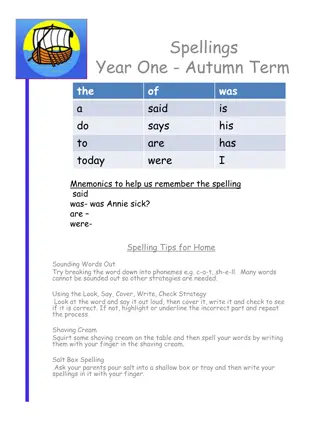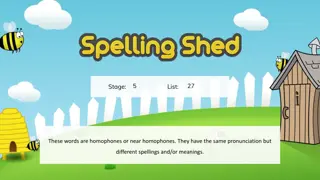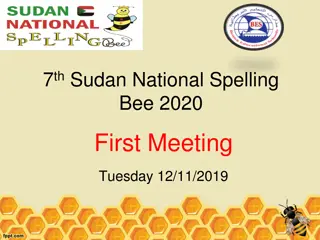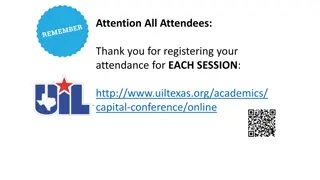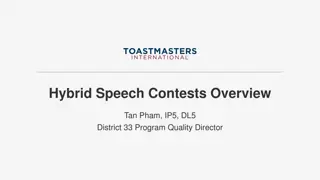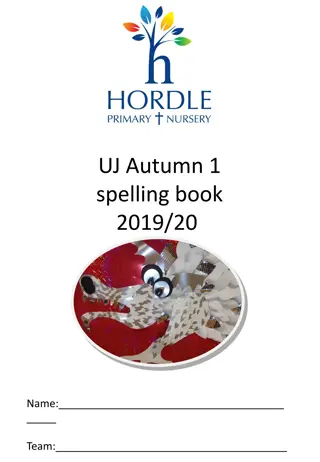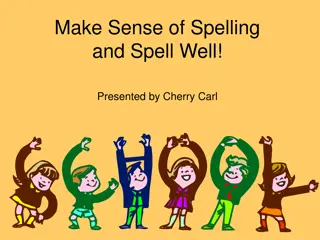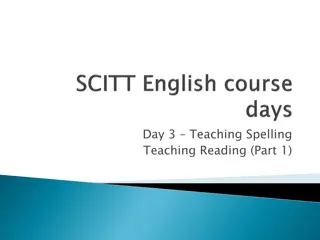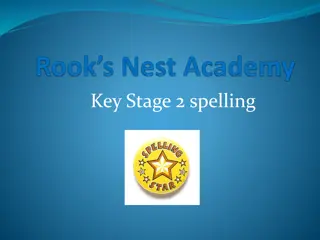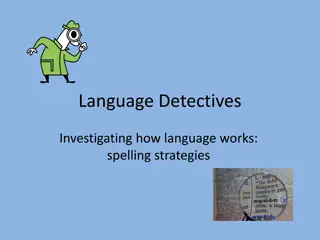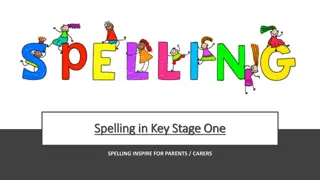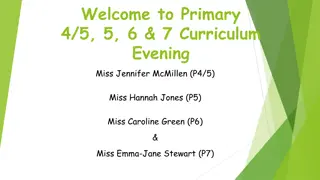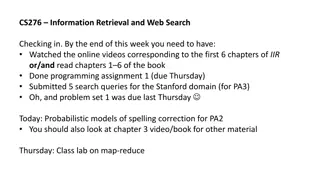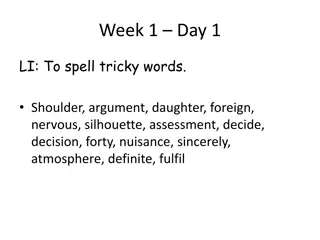Strategies for Success in UIL Spelling and Vocabulary Contests
Strategies for achieving success in UIL Spelling and Vocabulary contests are highlighted in this content. It emphasizes the importance of correct spelling, the significance of vocabulary proficiency, and the role of precise language in effective communication. Insights from renowned figures like Marilyn vos Savant and Thomas Jefferson underscore the value of mastering spelling and vocabulary. Attendees are encouraged to access electronic handouts for further guidance.
Download Presentation

Please find below an Image/Link to download the presentation.
The content on the website is provided AS IS for your information and personal use only. It may not be sold, licensed, or shared on other websites without obtaining consent from the author. Download presentation by click this link. If you encounter any issues during the download, it is possible that the publisher has removed the file from their server.
E N D
Presentation Transcript
Linda Berrey Contest Director BECOMING A SPELLEBRITY: Strategies That Lead to Success in UIL Spelling and Vocabulary
Attention, All Attendees: Thank you for registering your attendance for EACH SESSION: http://www.uiltexas.org/academic s/capital-conference/online Electronic handouts are available there too.
Man is separated from all other animals by the ability to communicate across space and time. This ability is made possible by written language. Communication in writing is made possible by man s agreement on the symbols he uses.
The agreed sequence of those written symbols is called Spelling.
The Importance of Correct Spelling When our spelling is perfect, it s invisible. But when it s flawed, it prompts strong negative associations. --Marilyn vos Savant Take care that you never spell a word wrong. Always, before you write a word, consider how it is spelled, and, if you do not remember, turn to a dictionary. It produces great praise to a lady to spell well. --Thomas Jefferson in a letter to his daughter Martha
Spelling counts. Spelling is not merely a tedious exercise in a fourth-grade classroom. Spelling is one of the outward and visible marks of a disciplined mind. --James J. Kilpatrick Journalist and grammarian
Why so much vocabulary?? Vocabulary is the best single indicator of intellectual ability and an accurate predictor of success in school. --W.B. Elley, education professor emeritus and literacy researcher
To put it simply, spelling and vocabulary are important! Correctly spelled words, coupled with precise and compelling diction, are two of the most important aspects of effective communication.
This is the Official Word list for this Contest. It also contains the rules and procedures for the contest as well as a sample test. The UIL Constitution is the source for all the rules.
UIL Spelling and Vocabulary Contest PART I. PROOFREADING AND VOCABULARY PART II. SPELLING FROM DICTATION PART III. TIE-BREAKER
Part I Proofreading
Part IProofreading 15 points - requires that contestants given sets of five-word lists recognize the word which is misspelled in each list and write it spelled correctly Most of the words from this section of the test are from Word Power Up to twenty percent (20%) of the words on this part of the test may be from other sources Questions 1-15 of Part I are comprised of 15 Proofreading sets. Each question is worth one point each.
Part I Vocabulary
PartIVocabulary 15 points - multiple choice test of word origins and meanings The 350 words designatedfor this part of the test are marked in the Word Power list with a DOT. The Vocabulary section has NO misspelled words, but contestants are still responsible for the correct spelling of these words. Questions 16-30 are comprised of vocabulary entries and are worth one point each.
PartII.Spelling from Dictation 70 points - 70 words, pronounced at a rate of 4 words per minute - one every fifteen seconds. A definition will be given for every word.
PartIII. Tie-breaker 20 words, pronounced at 4 words per minute with definitions given for all words. With the exception of the State Meet, this part is scored ONLY in case of ties and then only those involved in the tie are scored.
Sources of Words A minimum of 80% of the test words for questions 1-15 of Part I and Parts II and III come from the Word Power list. Up to 20%come from Common Usage, Words from school course materials, such as textbook glossaries, News and Current Events - Words and Proper names Vocabulary Builders - roots and affixes which appear in the list as other parts of speech, and other words of interest.
How to prepare for those dreaded outside words Study roots and affixes. Read widely and to PAY ATTENTION to words that are new to them. Go to the Internet and find lists of SAT or college vocabulary. For instance, quizlet.com has a list called College Board Top 100 SAT/ACT Vocabulary Words. Majortests.com also has helpful word lists. A great list of 5,000 (yes, 5,000!) words can be found at freevocabulary.com Take vocabulary tests on Facebook Sign up for Word of the Day with dictionary.com
The Official Dictionary The ONLYofficial dictionary of this contest is The American Heritage Dictionary of the English Language, Fifth Edition, Fiftieth Anniversary Printing (2018 edition). All the contest words are in this dictionary. NOTE: Neither the paperback nor online dictionaries are acceptable resources.
In Case of Error in the Word Power List If the Word Power list has an error in spelling, the correction is announced in the Official Notices of the Leaguer, the UIL s newspaper, which is now found online at the UIL website, as well as on the Spelling page on the UIL website.
Using Language Skills to Build Strength in Spelling Phonics, Pronunciation, and Spelling
Sounding out Words Pure Vowels Diphthongs Vowel pairs Rules for long and short vowels Pure consonants and blends Sound=Symbol correspondence Sound Color
Tips for Spelling Q: How do you spell a really long word? A: Sound it out!
SUPERCALIFRAGILISTICEXPIALIDOCIOUS SUPER CALI FRAGIL ISTIC EXPI ALI DO CIOUS
Pronunciation Spelling is a very recent language skill. Before there was a written form of language, there were words. The invention of the printing press made it necessary to come to agreement on how to present words in writing.
Sound-Symbol Correspondence In languages like Latin and Spanish, there is a direct correspondence between sound and symbol: each sound is represented by a specific symbol. In other languages, including English, a speech sound may be represented by several symbols and a symbol may represent several sounds, depending on the letters around it.
Problems in Pronunciation PRONOUNCE ghoti
Problems in Pronunciation Non-correspondence exceptions: ghoti is pronounced fish How? cough women nation This is English!!
Lets take a look at the word MERCEDES What do you notice about the vowels?
They are the same single letter but with three different pronunciations! Mer = m r ced = s d es = s
And heres a nice one on English spelling attributed to Oscar Wilde If GH can stand for P as in Hiccough If OUGH stands for O as in Dough If PHTH stands for T as in Phthisis If EIGH stands for A as in Neighbor If TTE stands for T as in Gazette If EAU stands for O as in Plateau The right way to spell POTATO should be: GHOUGHPHTHEIGHTTEEAU!
The troublesome SCHWA The most common sound in the English language, represented in the dictionary by the upside-down e . The schwa falls only on unstressed syllables. Any vowel can make the sound, and so can y . Sometimes the schwa can even show up where vowels fear to tread, as in rhythm .
The SCHWA And only in the English language can a single sound be so versatile! It s why there are no spelling contests in other languages. In Romance languages, like French and Spanish, vowels are predictable. Take for example the word banana. In Spanish the three a sounds are identical, but in English, the because the stress falls on the middle syllable, the first and third a sounds become schwas.
And because English absorbs words from every language, words with obvious spellings in their native tongues can become mysterious.
Problems in Pronunciation Schwa = SUPERCALIFRAGILISTICEXPIALIDOCIOUS and SUP RCAL FRAG LISTICEXPIAL DOC S
Watch and Listen for acolyte ( k -l t ) adenoma ( d n-o m ) babushka (b -boosh k ) cacophonous (k -k f -n s) distensible (d -st n s -b l) indecipherable ( n d -s f r- -b l) pachydermatous (p k -d r m -t s) (These words are not from this year s list)
Problems in Pronunciation Consonant Blends Consonant pairs (bl-,br-, ch, etc.) have blended sounds that are different from that of the letters when pronounced separately. Diphthongs (Vowel pairs) such as -ae, -ai, -au, -ea, etc.)are the same issue. Separating these pairs into their component sounds, exaggerating each sound, facilitates spelling.
One solution Sound Color = exaggerated Pure letter-sound Consonant/vowel blends can be more troublesome; they may sound the same but look different: Precious > preshus Contentious > contenshus precious > preCEEus contentious > contenTEEus Speak the Spelling!
Troublesome Spelling Items Compound words Words with non-alphabetical marks Words with alternate spellings Capitalized words Words with optional capitalization Words where definition determines capitalization Capitalization within a word Both capitalization and lower-case entries
Examples from this years Word Power list Non-alphabetic elements Alzheimer s disease Champs lys es C te d Ivoire Cre sa quincea era billet-doux Two- and three- word test items mercury vapor lamp do-it-yourselfer martial law brave new world anaphylactic shock
Examples from this years Word Power List Alternate Spellings muraled or muralled peripeteia or peripetia jackbooted or jack-booted hippogriff or hippogryph yashmak or yashmac mustache or moustache
Capitalization Capitalization Required Sagittarius Laotian Gettysburg Baghdad Capitalization depends on the definition given composite = made up of distinct parts Composite= an architectural style Capitalization Optional Oedipal, oedipal Medicaid, medicaid echeveria=a tropical American plant Echeveria=the plant genus
More capitalization issues Words with both upper and lower cases Jacob s ladder rose of Jericho Capitalization within a word McCarthyism Pooh-Bah
Words Pronounced Differently Depending on Part of Speech or Definition decrypt (d -kr pt ) v. (d kr pt ) n. indurate ( n d -r t ,-dy -) v. ( n d -r t, -dy -) adj.
Root Words, Language History, and Spelling Words can be put together from source words and root words to form words that never existed before: Tele = distance -metrics = measurement -phony = sound -graphy = writing -vision = viewing
New Needs = New words from old parts Television Telephone Telemetry Telegraph
Root Words and Affixes a- : without angio- : pain arterio- : artery arthro- : joints cardio-: heart chrono- : time cranio- : skull dys -: unhealthy -ectomy : cutting out eu- : healthy -graphy: recording, writing hemo- : blood -itis: inflammation laryngo- :throat lipo- : fat litho- : stone mal- : bad meter : measure myelo- : muscle
Root Words and Affixes neuro- : nerve -ology: study oto- : ear -otomy : cutting into -ous : full of patho- : illness -pathy : disease peri- : around -pnea : breathing rhino- : nose syn- : same thoraco- : chest thrombo- : clot trauma- : damage or injury There are many more that you can find as they are used in the WordPower list. Google Root Words for much more on this topic.
Root Words and Affixes Oto- = ear -rhino- = nose -laryng- = throat -ologist = One who studies Ear, Nose and Throat doctor = Otorhinolaryngologist
Root Words and Affixes As you study the Word Power list, especially for Vocabulary Words, make lists of the Root Words, prefixes, and suffixes you identify. That way you learn the pieces once and have them every time you need them, such as when you take the SAT.


